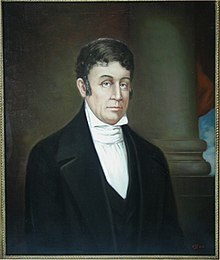Archibald Roane
Archibald Roane (born around 1760 in Lancaster County , Province of Pennsylvania , † January 18, 1819 ) was an American politician ( Democratic Republican Party ) and the second governor of the state of Tennessee .
Early years
Archibald Roane was raised after the death of his parents in 1767 and 1768 by his uncle John Roane, who also provided an adequate education. In the Revolutionary War he fought for the American cause under George Washington . From 1788 he was based in what is now Tennessee. When Roane settled in Jonesborough as a lawyer, that part of the country was again part of North Carolina . Immediately beforehand, a four-year attempt to give the country the status of a separate state under the name State of Franklin had failed. A little later, North Carolina handed the area over to the federal government, which established the Southwest Territory there . Governor of this territory was William Blount , who made Roane as his protégé to the prosecutor in the Washington district. Roane, who had since moved to Jefferson County , became a delegate to the Tennessee Constitutional Convention in 1796. In the following years he worked as a judge.
Tenure as governor of Tennessee
In 1801, Governor John Sevier could no longer run for this office because the constitution only allowed three consecutive terms. Sevier had reached that limit. As his successor, Roane was elected second governor of the state of Tennessee. During his tenure, the three constituencies for congressional elections were reallocated.
The legislature was overshadowed by a political controversy. This was triggered by the discussion about the position of the commanding general of the militia. In addition to ex-Governor Sevier, the young Andrew Jackson also applied for this post. The parliamentary vote resulted in a stalemate and Governor Roane had to decide who should go to the office. Jackson was a friend of Roane's political foster father, William Blount. So he chose Jackson. With this he drew the enmity of Sevier, who was already engaged in a long-term feud with Jackson that almost ended in a duel in 1803 . This controversy moved Sevier in 1803 to run again for governor against Roane. It was relatively easy for him to win the elections and to drive Roane out of office, whom even Jackson's support could not help.
Old age and death
After retiring from governor's office, Roane returned to practice as a lawyer. From 1811 until his death he worked as a judge in various courts, including the Tennessee Supreme Court of Errors and Appeals . He was married to Mary Hamilton Campbell.
Web links
- Archibald Roane in the National Governors Association (English)
- The governors of Tennessee (English)
- Archibald Roane in the database of Find a Grave (English)
| personal data | |
|---|---|
| SURNAME | Roane, Archibald |
| BRIEF DESCRIPTION | American politician |
| DATE OF BIRTH | around 1760 |
| PLACE OF BIRTH | Lancaster County , Pennsylvania |
| DATE OF DEATH | January 18, 1819 |

